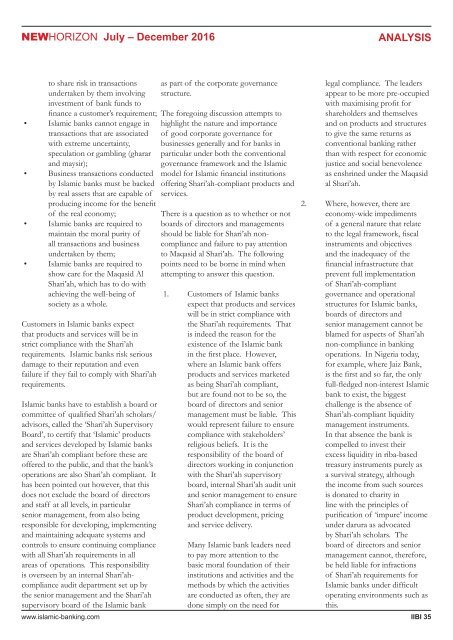NH-2016-q2
You also want an ePaper? Increase the reach of your titles
YUMPU automatically turns print PDFs into web optimized ePapers that Google loves.
NEWHORIZON July – December <strong>2016</strong><br />
ANALYSIS<br />
to share risk in transactions<br />
undertaken by them involving<br />
investment of bank funds to<br />
finance a customer’s requirement;<br />
• Islamic banks cannot engage in<br />
transactions that are associated<br />
with extreme uncertainty,<br />
speculation or gambling (gharar<br />
and maysir);<br />
• Business transactions conducted<br />
by Islamic banks must be backed<br />
by real assets that are capable of<br />
producing income for the benefit<br />
of the real economy;<br />
• Islamic banks are required to<br />
maintain the moral purity of<br />
all transactions and business<br />
undertaken by them;<br />
• Islamic banks are required to<br />
show care for the Maqasid Al<br />
Shari’ah, which has to do with<br />
achieving the well-being of<br />
society as a whole.<br />
Customers in Islamic banks expect<br />
that products and services will be in<br />
strict compliance with the Shari’ah<br />
requirements. Islamic banks risk serious<br />
damage to their reputation and even<br />
failure if they fail to comply with Shari’ah<br />
requirements.<br />
Islamic banks have to establish a board or<br />
committee of qualified Shari’ah scholars/<br />
advisors, called the ‘Shari’ah Supervisory<br />
Board’, to certify that ‘Islamic’ products<br />
and services developed by Islamic banks<br />
are Shari’ah compliant before these are<br />
offered to the public, and that the bank’s<br />
operations are also Shari’ah compliant. It<br />
has been pointed out however, that this<br />
does not exclude the board of directors<br />
and staff at all levels, in particular<br />
senior management, from also being<br />
responsible for developing, implementing<br />
and maintaining adequate systems and<br />
controls to ensure continuing compliance<br />
with all Shari’ah requirements in all<br />
areas of operations. This responsibility<br />
is overseen by an internal Shari’ahcompliance<br />
audit department set up by<br />
the senior management and the Shari’ah<br />
supervisory board of the Islamic bank<br />
as part of the corporate governance<br />
structure.<br />
The foregoing discussion attempts to<br />
highlight the nature and importance<br />
of good corporate governance for<br />
businesses generally and for banks in<br />
particular under both the conventional<br />
governance framework and the Islamic<br />
model for Islamic financial institutions<br />
offering Shari’ah-compliant products and<br />
services.<br />
There is a question as to whether or not<br />
boards of directors and managements<br />
should be liable for Shari’ah noncompliance<br />
and failure to pay attention<br />
to Maqasid al Shari’ah. The following<br />
points need to be borne in mind when<br />
attempting to answer this question.<br />
1. Customers of Islamic banks<br />
expect that products and services<br />
will be in strict compliance with<br />
the Shari’ah requirements. That<br />
is indeed the reason for the<br />
existence of the Islamic bank<br />
in the first place. However,<br />
where an Islamic bank offers<br />
products and services marketed<br />
as being Shari’ah compliant,<br />
but are found not to be so, the<br />
board of directors and senior<br />
management must be liable. This<br />
would represent failure to ensure<br />
compliance with stakeholders’<br />
religious beliefs. It is the<br />
responsibility of the board of<br />
directors working in conjunction<br />
with the Shari’ah supervisory<br />
board, internal Shari’ah audit unit<br />
and senior management to ensure<br />
Shari’ah compliance in terms of<br />
product development, pricing<br />
and service delivery.<br />
Many Islamic bank leaders need<br />
to pay more attention to the<br />
basic moral foundation of their<br />
institutions and activities and the<br />
methods by which the activities<br />
are conducted as often, they are<br />
done simply on the need for<br />
legal compliance. The leaders<br />
appear to be more pre-occupied<br />
with maximising profit for<br />
shareholders and themselves<br />
and on products and structures<br />
to give the same returns as<br />
conventional banking rather<br />
than with respect for economic<br />
justice and social benevolence<br />
as enshrined under the Maqasid<br />
al Shari’ah.<br />
2. Where, however, there are<br />
economy-wide impediments<br />
of a general nature that relate<br />
to the legal framework, fiscal<br />
instruments and objectives<br />
and the inadequacy of the<br />
financial infrastructure that<br />
prevent full implementation<br />
of Shari’ah-compliant<br />
governance and operational<br />
structures for Islamic banks,<br />
boards of directors and<br />
senior management cannot be<br />
blamed for aspects of Shari’ah<br />
non-compliance in banking<br />
operations. In Nigeria today,<br />
for example, where Jaiz Bank,<br />
is the first and so far, the only<br />
full-fledged non-interest Islamic<br />
bank to exist, the biggest<br />
challenge is the absence of<br />
Shari’ah-compliant liquidity<br />
management instruments.<br />
In that absence the bank is<br />
compelled to invest their<br />
excess liquidity in riba-based<br />
treasury instruments purely as<br />
a survival strategy, although<br />
the income from such sources<br />
is donated to charity in<br />
line with the principles of<br />
purification of ‘impure’ income<br />
under darura as advocated<br />
by Shari’ah scholars. The<br />
board of directors and senior<br />
management cannot, therefore,<br />
be held liable for infractions<br />
of Shari’ah requirements for<br />
Islamic banks under difficult<br />
operating environments such as<br />
this.<br />
www.islamic-banking.com IIBI 35


